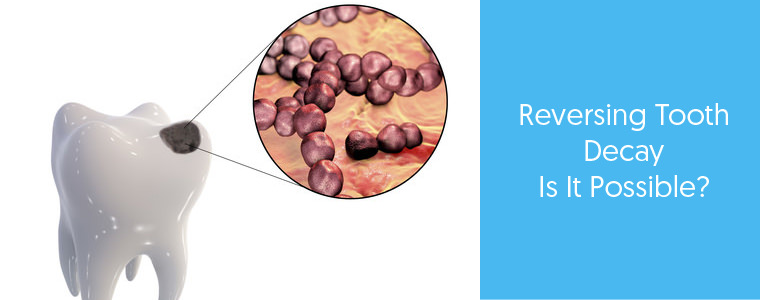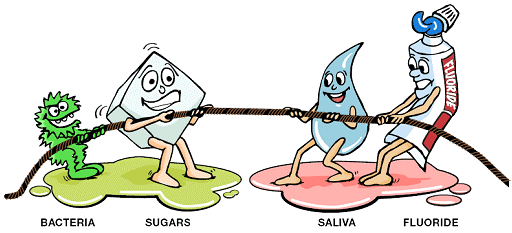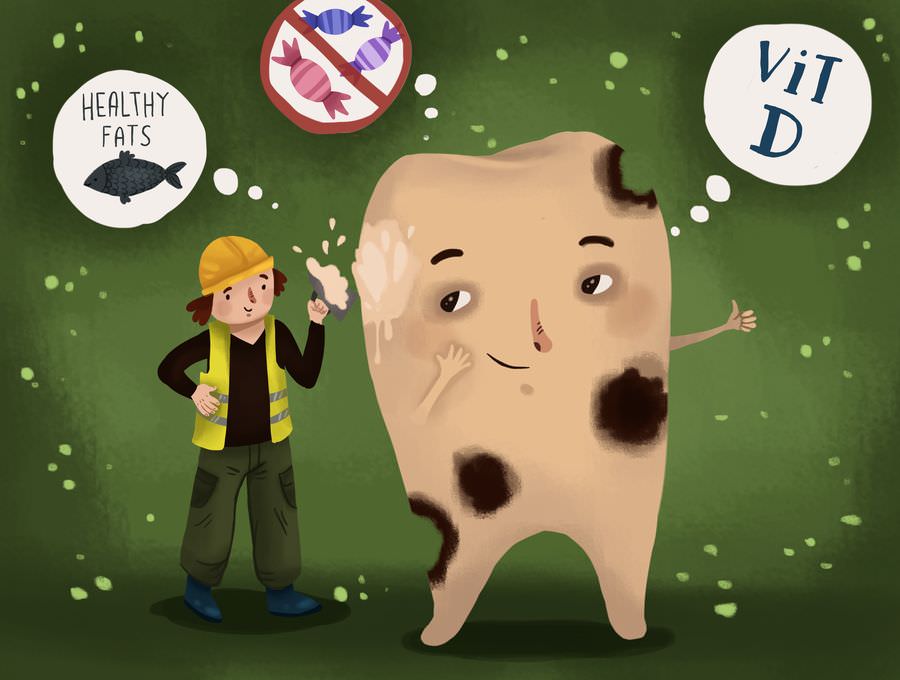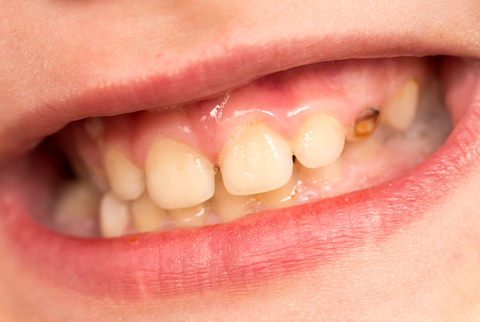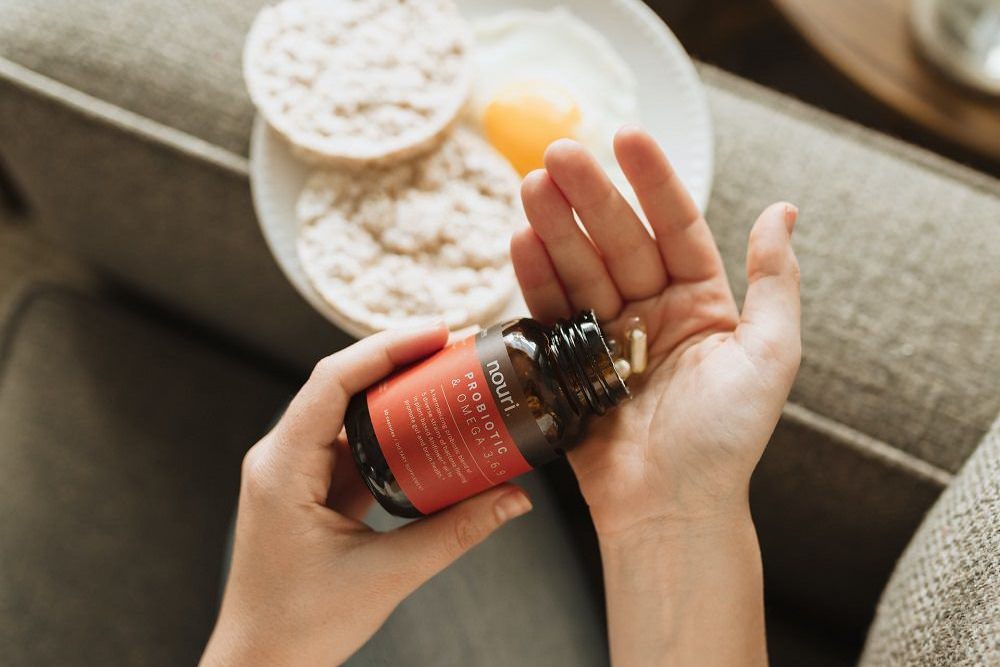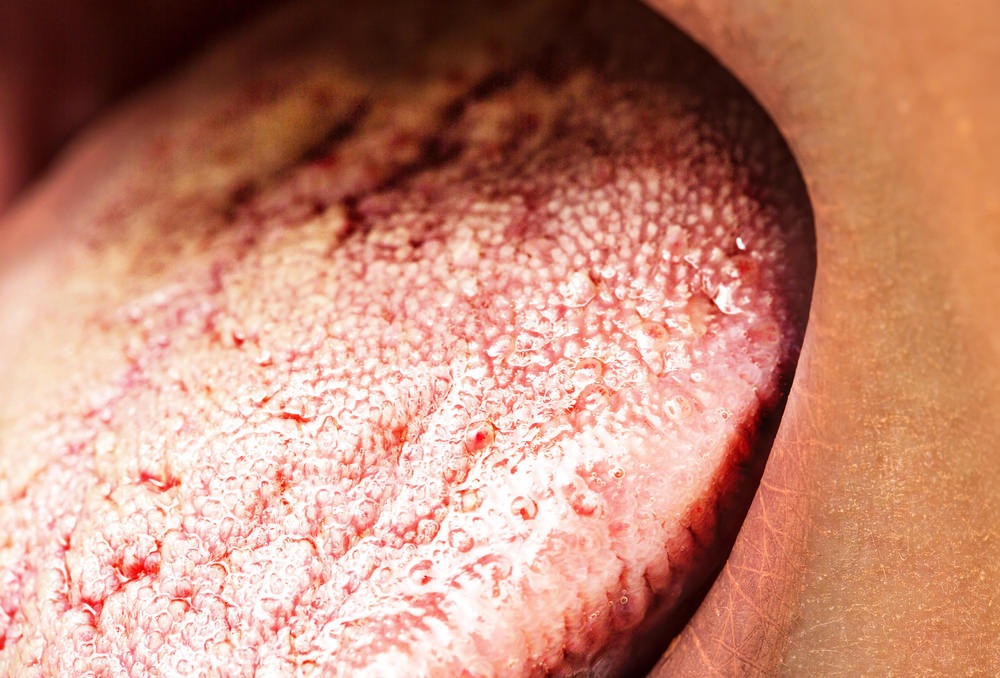Reversing Tooth Decay and Healing Cavities Naturally
More information is surfacing about the possibility of reversing tooth decay and healing cavities naturally.
So, the question is – can cavities really heal on their own?
In simple terms, the answer is “yes” in the early stages.
If you have model oral settings, including the proper pH levels, the minerals you consume, such as calcium and phosphorus, are deposited onto your teeth from your saliva.
Yep, what I’m saying is, when your saliva contacts with your teeth, minerals are exchanged. These then bond with the enamel on your teeth and heal deficiencies.
However, the effect of demineralising foods and beverages, such as sugars, acidic foods and drinks, and phytic acid, as well as oral problems such as a dry mouth, must be taken into consideration.
Thus, finding ways to counterbalance these potentially destroying issues is important to encouraging the tooth healing process known as remineralisation.
Keeping a healthy balance of bacteria’s, by having a healthy diet, along with restoring your microbiome, will allow you to appreciate the nutrients that your teeth needs to repair damage.

A healthy, well balanced diet is important for your teeth and preventing tooth decay
What I will be sharing with you today gives you all the knowledge needed – assisting you, where possible, to reverse tooth decay and cavities in the comfort of your own home rather than in the Dental chair!
This includes;
- The process of remineralisation
- Foods to Eat
- Foods to Avoid
- Several At-Home Remedies
This post is a little longer than normal, so see below a Table of Contents.
This will help you skip straight through to any section you would prefer to read.
Cavities and Traditional Dentistry
A dental cavity is one of the most common results of tooth decay, often occurring in both adults and children.
According to traditional Dentistry, there’s only one way to treat a cavity – with drilling and implanting foreign objects such as fillings.
However, our teeth were created with the ability to heal themselves – if you take proper care of them.
Cavities are formed when the naturally occurring bacteria in your mouth attaches to the hard-outer surface (enamel) of your teeth and produces a build-up of plaque.
This plaque protects the bacteria, resulting in its continued growth.
If you have a good dental care regime where you regularly brush, floss and rinse, you can rid yourself of this plaque.
The minerals in our saliva also bond with the plaque, which creates a hard substance known as tartar.
Tartar can only be removed by a Dental professional, but if untreated, it dissolves the calcium in your teeth.
This process, known as “demineralisation”, wears away the enamel of your teeth, causing decay and opening up tiny holes, known as cavities.
We are advised to visit the Dentist to fix these issues – and that’s not necessarily a bad thing.
Your Dentist can find a cavity in your regular check-up long before you know of its existence, simply from probing your teeth, looking for soft spots, or using x-rays.
You, however, may have not noticed any symptoms as the cavity is just beginning and the cavity is only small – the symptoms only become noticeable once the decay gets larger.
The more immediate your diagnosis, the easier your treatment.
Unfortunately, there are consequences of traditional Dental procedures.
Your mouth is a very sensitive environment, and whilst drilling is often necessary, it can potentially expose the inner layer of your teeth (the pulp) to bacteria.
Any foreign object you put in your mouth may also have its consequences, including artificial materials, such as those used for caps, crowns, and fillings that are necessary for fixing decay and cavities.
As they say, prevention is better than cure – so can we really prevent and potentially even cure cavities naturally?
Cavities and Your Diet
I think the first question that may be on your mind is – why are cavities such an issue in the first place?
Looking back in history, as society as whole has updated and upgraded, our diets have changed drastically.
Many generations ago, our ancestors survived on complex carbohydrates and fermented foods. Their diets contained absolutely no processed foods and minimal sweets.
Research shows an increase in tooth decay in modern societies, and there seems to be a causal relationship between this increase and the increased intake of refined sugars, which of course leads to cavity development.
Improving your diet reduces the amount of acids on your tooth enamel and may help prevent cavities from forming.
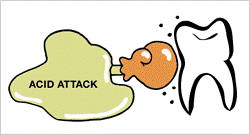
Foods that are acidic in nature are not good for your teeth
The National Institutes of Health advises patients to avoid eating sugary and starchy foods like cookies, lollies and bread.
You should also drink fewer soft drinks, citrus juices and milk.
Try not to snack between meals to give your teeth time to improve from the exposure to acids. However, keep in mind that it’s a matter of opinion as to whether a better diet can reverse cavities that have already formed.
Many believe if the damage is too bad, it’s irreversible. Catch it early enough, and you can fix it.
Making adjustments to your diet involves eating a foods containing enough minerals, fat-soluble vitamins, and nutrients so your teeth can absorb them, and avoiding the foods that will deplete your teeth of nutrients.

A healthy diet is a good start in preventing or reversing tooth decay
This is one of the main factors in reversing decay and healing cavities.
We will discuss the core foods below, or for the full source, read our article “Foods that Heal Cavities – and Foods that Don’t”.
Can You Get Rid of Your Cavities at Home?
There are varying opinions on this, but all come to one conclusion – you should still your Dentist for your twice-yearly check-ups, so they can diagnose whether you have any cavities.
Treatments should be discussed with them, to ensure no complications arise.
However, there are several at-home remedies that can strengthen your tooth enamel.
This process, known as remineralisation, may also be supported by your Dentist depending on how severe the cavity – the main opinion being that it may only be possible to reverse a cavity caught in its’ early stages.
At the very least, the early stages of tooth decay can be reversed – and you can use these remedies to prevent further cavities from forming.
At-home Remedies
Use more Fluoride
This 2014 study shows that high-fluoride toothpaste significantly hardens tooth enamel.
Fluoride is a mineral that can stop tooth decay from progressing. It can even reverse, or prevent, early tooth decay.
Fluoride prevents mineral loss in tooth enamel, replaces lost minerals and decreases the ability of bacteria to develop acid.
Uptake your intake of fluoride by drinking fluoridated water or brushing with fluoride toothpaste.
If your Dentist thinks you need more fluoride, they may apply a fluoride gel or varnish to tooth surface, prescribe fluoride tablets, or recommend a fluoride mouth rinse.
Please note – not all bottled water products contain enough fluoride to prevent tooth decay.
Only some bottled waters contain naturally occurring fluoride.
Australian food regulations do permit the voluntary addition of fluoride to bottled water, but only if the total amount of fluoride is between 0.6 – 1 milligram per litre.
Any bottled water with added fluoride that is sold in Australia must be clearly labelled with an analysis and words stating that the product contains “added fluoride”.
If you only drink bottled water, read this labelling to ensure you make an informed decision about your drinking water.
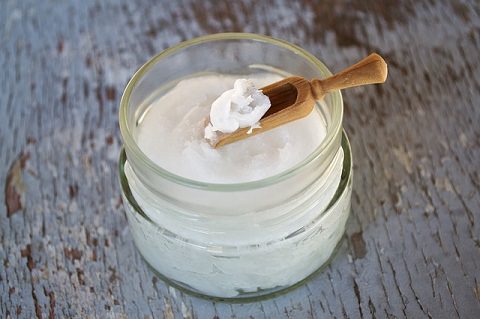
Coconut oil used in oil pulling
Oil Pulling
Oil pulling is in ancient method that involves swishing sesame oil or coconut oil around in your mouth for between 5 to 20 minutes to “pull” the toxins out and remove the bacteria that cause cavities.
This 2009 study found that using sesame oil in the pulling technique reduced the amount of plaque and bacteria to the same degree as mouthwash.
If oil pulling reduces plaque, it may help to prevent cavities, although more studies are needed to confirm this.
For more information on oil pulling, view our article “The Ultimate Guide to Oil Pulling”.
Aloe Vera
Aloe Vera tooth gel has an antibacterial effect that may help kill the harmful bacteria that causes cavities, as shown in this 2015 review.
While more research on this is required, studies done so far are showing that the gel may help your enamel’s remineralisation process.
Avoid Phytic Acid
Phytic acid can damage your tooth enamel and some believe that eliminating it from your diet can prevent and even reverse tooth decay and cavities.
This study done in the 1930s linked cavities to a diet high in phytic acid.
A 2004 study found that phytic acid affects the minerals absorbed from food.
This leads to further suggestions that phytic acid may also weaken the minerals in your enamel and lead to tooth decay.
Please note that there were less than 20 people involved in the study though.
Phytic acid is most commonly found in maize, wheat, rice, rye, beans, grains, almonds, corn, barley, brazil nuts, hazelnuts, oats, peas, tofu, sesame seeds, walnuts and lentils.
Although more research is needed to conclude whether phytic acid affects the minerals in tooth enamel, all studies are pointing in the direction that it is worth it is worth avoiding if you can.
Vitamin D
This 2013 review showed Vitamin D supplements helped to reduce dental cavities significantly.
It is believed to strengthen tooth enamel by helping to absorb calcium and phosphate from the foods you eat.
Many home treatments are based off this study performed in the 1930s, which suggested that cavities are caused by deficiency of Vitamin D in the diet.
In this study, children decreased the number of cavities they had by adding Vitamin D to their diets.
Those who added Vitamin D whilst also removing grains from their diets had the best results – possibly a result of removing the phytic acid from their diets as well.
Although more recent studies have actually disputed this evidence, there is certainly no harm in adding Vitamin D into your diet – up your intake in the form of supplements, sunshine, or dairy products.
Remove Sugar
Sugar is known to be one of the main causes of cavities, as it feeds the nasty bacteria in your mouth and forms an acid which eats away at your tooth enamel.
The World Health Organisation (WHO) recommends reducing your sugar intake to less than 10% of your total calorie intake for the day.
Once the sugar is gone from your diet, your enamel has a chance to heal – but if you are constantly eating sugar, you’re not giving your teeth a break.
Eat Liquorice Root
Liquorice root has antibacterial properties, which may help to heal cavities, according to a trial performed in 2011.
Another study done in the same year showed that sucking on a lollipop that contained liquorice extract also helped to prevent cavities.
However, further research is required before Dentists’ will recommend these lollipops for the prevention of cavities!
Sugarless gum
Chewing sugar-free gum after eating can significantly reduce the levels of bacteria in the mouth that damaged enamel, a study performed in 2015 proved.
Other studies have also shown that chewing gum after eating helps with the process of remineralisation.
When to See Your Dentist
Not all cavities can go through the process of remineralisation – only those in the beginning stages of any formation.
A tooth can become so decayed that it needs to be removed.
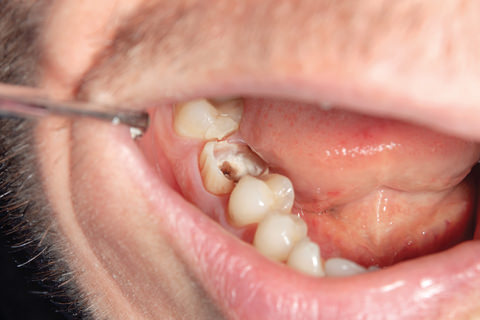
A patient with tooth decay
A cavity that has broken through your dentine, or a cavity that’s gone so far that it’s causing pain in the affected tooth, cannot be saved.
Pain is a sign that the damage is too great to be reversed, and you should see your dentist for treatment.
However, not all cavities cause pain, so this is why it is essential to see a dentist for your regular check-ups.
Each Dentist oversees whether the cavity has the potential for remineralisation.
Basically, between the moment a cavity forms and is diagnosed, and by the time it breaks through your dentine, there’s kind of an unknown area.
This is where remineralisation may be possible, but only if the cavity is caught in time.
Dentists can detect cavities at an early stage and recommend preventive action.
Otherwise, they may also provide a filling, crown, or other treatment for advanced cases of decay.
FAQ’s
So, to conclude, here are the basics you need to know about healing cavities naturally;
What is Remineralisation?
Remineralisation is the natural process in which your teeth repair themselves.
It works through the saliva in your mouth, which is similar to the blood in your body – it moves around the different organisms through the different biofilm groups.
The saliva also puts the minerals, like calcium, onto your teeth. These minerals bond with the enamel on your teeth and help to restore any deficiencies.
That process is “remineralisation”.
Would a Dentist Recommend Remineralisation to Everybody?
Simple answer – no.
Firstly, you must determine whether you are willing and able to take the necessary steps to heal the decay on your own.
This may mean making massive adjustments to your diet.
So, for example, if I see a patient who is quite healthy and interested in reversing tooth decay, they are the main contender for remineralisation.
However, if I see a teenager with an early cavity who eats a lot of junk food and is unlikely to make the necessary adjustments to their diet, I am unlikely to recommend remineralisation.
How Long Does the Remineralisation Process Take?
Cavities cannot be healed overnight, or even in a couple of weeks.
Expect to wait 3 – 4 months for remineralisation to work its wonders.
Typically, your dentist will recommend you revisit in 6 months if they have found the beginning stages of a cavity.
If you are following the process of remineralisation, they should see at this visit whether the cavity is healed (or on its way to healing) and can decide on further treatment.
How Does Remineralisation Work?
A proper diet is the main factor in both reversing and preventing cavities.
You must consume more of the foods and nutrients that help heal cavities naturally, such as;
- Calcium
- Fruits and vegetables
- Vitamin D
- Vitamin K2
- Magnesium
- Phosphorus
You must also avoid foods that encourage demineralisation.
Eliminate or limit your intake of highly acidic foods and beverages.
If you do eat or drink acidic foods or beverages, minimise their effect by rinsing your mouth immediately afterwards, or waiting 30-45 minutes and then brushing. Avoid sugary foods or also rinse your mouth immediately afterwards.
Avoid antibacterial mouthwashes and only use all-natural mouthwashes, as these do not kill all of the bacteria in your mouth – beneficial bacteria are needed to help rebalance your oral microbiome.
Your mouth is a delicate microbiome, with multiple concentrations of minerals, bacteria, acids, pH levels, and more.
Maintaining a proper balance of this microbiome is important for healing a cavity. I recommend a mouth rinse with a high pH (9 or higher).
Can I Heal my Child’s Cavity?
Kids are seemingly more susceptible to cavities than adults.
This is because an adult’s body isn’t still growing and laying down bone for growth, like in children.
Thus, the resources for remineralisation in a child is not as available because their bodies are still growing.
As such, it is vital to increase your child’s levels of calcium and other minerals to increase their chances of achieving successful remineralisation.

Introducing whole foods into your kid’s diet is a definite positive!
Foods rich in calcium are important for rebuilding the enamel of the tooth.
Chewing celery after a meal can act like a toothbrush to remove food particles.
Reducing their consumption of sugars will also help in creating a cavity-healing environment.
Along with ensuring they have a proper dental care regime, these are easy ways to increase a healthy microbiome in your child’s mouth.
Reversing Tooth Decay Tips
Other tips to help reduce tooth decay and cavities from the foods you eat – just because we can;
Eat sugary foods with meals – Your mouth makes more saliva during meals.
This helps to reduce the effect of acid production and rinses pieces of food from your mouth. Even better, limit your intake and save them for special occasions only.
Limit between-meal snacks – This reduces the number of acid attacks on teeth, giving your teeth a chance to repair themselves.
If you need a snack, choose something nutritious.
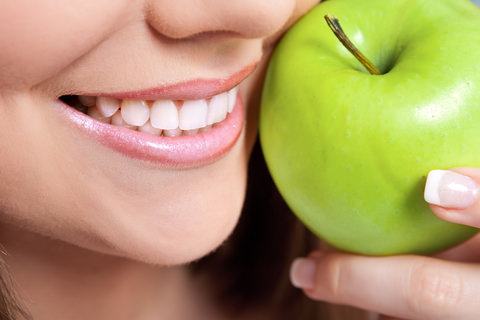
Try snacking on a crisp apple, it’s a great alternate!
Think about chewing sugarless gum afterwards to increase your production of saliva and wash away food and acid.
Drink more water – Fluoridated water can help prevent tooth decay.
If you drink bottled water, check the label to see its fluoride content.
Cavities cannot be reversed overnight – Don’t expect immediate results, or even to see them in a couple of weeks, it may take 3-4 of months for remineralisation to take effect.
Prevent pain during the process – Help keep your sensitivity at bay whilst performing your treatment by trying the following tips:
- Avoid over-brushing – Stick to morning and night as a general guide… and brush softly!
- Don’t drink anything acidic (yes, sorry to say, but that includes coffee, alcohol, citrus drinks and soft drinks!)
- Limit or eliminate highly acidic foods and beverages – This includes fruit juice. View the Daily Juice Recommendations from the American Academy of Paediatrics for advice on consumption levels. Also, minimise their effect by rinsing your mouth immediately after consuming or waiting 30-45 minutes and then brushing.
- Avoid antibacterial mouthwashes – I recommend choosing a mouth rinse with a high pH (9 or higher). Even rinsing out your mouth with plain water can help.
- Avoid eating or drinking anything with sugar in it before bedtime – The flow of your saliva decreases during sleep. With not enough saliva, your teeth are less able to heal themselves following an acid attack.
Conclusion
More research is needed to confirm whether Vitamin D, oil pulling, liquorice lollipops and chewing gum get rid of existing cavities. But they may keep your cavities from getting bigger.
At the very least, they can help fix softened or weakened decayed areas of your enamel. This could possibly prevent more cavities from developing. Still, some cavities are beyond saving, despite your best efforts.
The earlier a cavity is detected, the easier your treatment will most likely be. So be sure to still visit your Dentist for your regular check-ups.
Sourced from;
www.medicalnewstoday.com/articles/321259.php
https://www.nidcr.nih.gov/health-info/childrens-oral-health/tooth-decay-process?_ga=2.219344153.1269996075.1563793983-1483673903.1561276253
www.healthline.com/health/dental-and-oral-health/how-to-get-rid-of-cavities#the-bottom-line
https://www.ncbi.nlm.nih.gov/pmc/articles/PMC2520490/pdf/brmedj07379-0001.pdf
www.ncbi.nlm.nih.gov/pmc/articles/PMC2520490/?page=1
https://jada.ada.org/article/S0002-8177(15)01212-X/abstract
doi.org/10.4103/0972-0707.157240
www.healthychildren.org/English/healthy-living/nutrition/Pages/Fruit-Juice-and-Your-Childs-Diet.aspx
By Anthony Cade
Created at October 24, 2019, Updated at January 25, 2025


